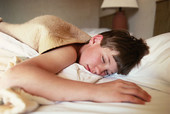
MONDAY, Feb. 13 (HealthDay News) — With televisions, computers, cellphones, school work and extracurricular activities, parents worry that their kids are so busy that they aren’t getting enough sleep.
But a new review suggests this is not a new problem, and perhaps it might not be a problem at all.
“Kids are sleeping less than they used to, with sleep declining by about 1.25 hours over the last 100 years,” said review co-author Tim Olds, a professor of health sciences at the Sansom Institute for Health Research in Adelaide, Australia.
But, he said, it’s not clear whether children are really missing that additional slumber.
“Health ‘experts’ have always recommended that kids get more sleep than they do, regardless of how much they get,” he explained.
What’s more, even 100 years ago, parents thought their children were shortchanging their shuteye time. In their review, Olds and his colleagues cited a study from 1905 that said: “The stress and strain of modern life necessitates increased brain activity, and in order that the mental energies may last, it is obvious that brain rest should be obtained.”
By 1923, things still hadn’t gotten much better. The researchers found this tidbit from research literature at that time: “the complexity and rush of modern life is not only affecting the adult [sleeping patterns] but is reflected in the children.”
Interestingly, no matter what the sleep concern — school books, radio, television, Internet — experts felt that the only way to counter the ‘overstimulation’ of the brain brought on by the latest technology was sleep.
After reviewing 100 years of research, Olds and his colleagues found 32 different sets of sleep recommendations.
Yet, the investigators weren’t able to find any convincing evidence to back up those sleep recommendations for children today or in the past. And between 1897 and 2009, the recommendations on nightly sleep dropped by about 0.71 minutes per year.
Coincidentally, the amount of sleep children actually got dropped during that same period by 0.73 minutes a night per year.
Overall, youngsters consistently got less sleep than what sleep experts recommended. On average, kids slept about 37 minutes less than whatever the ‘optimal’ recommendation of the day was, the study authors noted.
Olds said there probably isn’t a set number of hours of sleep that’s ideal for any individual child.
“There is a great deal of variability in optimal sleep amongst kids. One child may function best on seven hours, another on 11 hours,” he said.
In the review, the researchers noted that just because a child sleeps late doesn’t necessarily mean that he or she really needs more sleep. Just as people may eat when they are not hungry, children may sleep more even if they don’t really need it, the authors explained.
Just last week, Brigham Young University (BYU) researchers reported that most teens aged 16 to 18 don’t get the nine hours of sleep a night that federal guidelines recommend, and yet they perform better in school when they only get seven hours of shuteye each night.
One reason? The current federal guidelines are based on studies where teens were simply told to keep sleeping until they felt satisfied, the BYU researchers noted.
“If you used that same approach for a guideline on how much people should eat, you would put them in a well-stocked pantry and just watch how much they ate until they felt satisfied,” lead researcher Mark Showalter said in a university statement. “Somehow that doesn’t seem right.”
Olds, the review co-author, did recommend that parents “try to even out sleep between school days and non-school days to avoid yo-yo sleeping.” He also said parents should be alert to signs of sleepiness.
According to Dr. Edith Chernoff, a chronic disease physician at La Rabida Children’s Hospital in Chicago, daytime sleepiness is a key sign that your child isn’t getting enough sleep.
“Gauge your own kids, and see how well they’re doing during the day,” she recommended. If they’re sleepy during the day or early evening, they’re probably not getting enough sleep.
Chernoff said that parents don’t need to worry if they have trouble waking their kids in the morning; it’s not necessarily a sign of too little sleep. In young children, she said, if they are having a lot of tantrums and fight going to bed, but then fall asleep quickly, they’re probably not getting enough sleep.
The bottom line, Chernoff said, is to do what works for your family.
“This study pointed out that we are all concerned about children’s sleep, and that hasn’t changed over 100-plus years, even though we really don’t understand how much sleep is enough,” said Chernoff.
Parents today may feel that they rightly have more to be concerned about with all the gadgets filling their children’s spare time. But, Olds said today’s distractions probably aren’t any worse than those of yesteryear.
“The sleep guidelines study shows us that parents and educators are concerned about whatever the new technology of the time is: radio, television, Internet. I don’t think there’s anything especially noxious about today’s technology apart from its ubiquity, which makes it hard for parents to police. In 20 years’ time new technologies will be the focus of concern, perhaps wearable computers, or brainwave interpreters,” Olds added.
Results of the sleep review were released online Feb. 13, and are scheduled to be published in the March print issue of Pediatrics.
More information
Read more about sleep and children from the Nemours Foundation.

